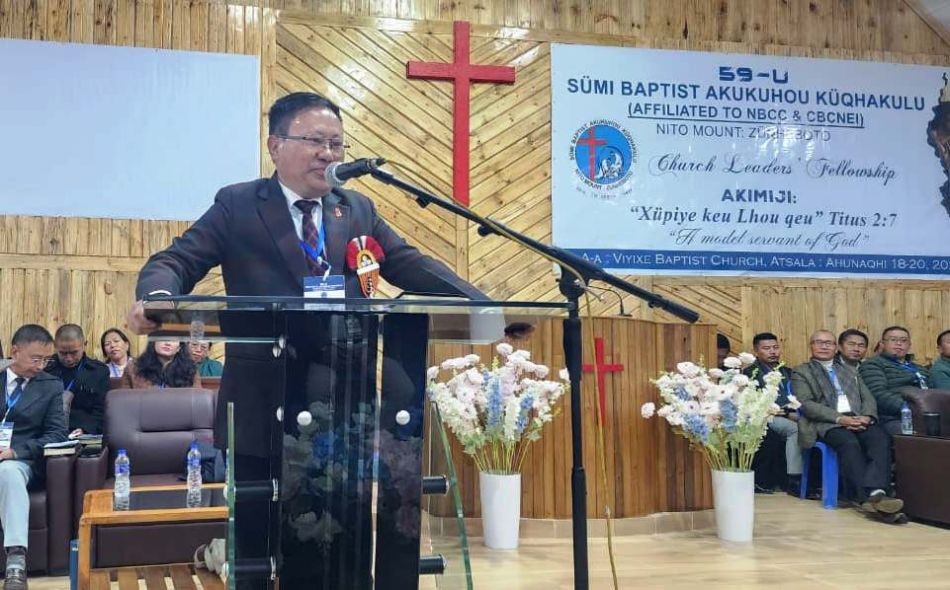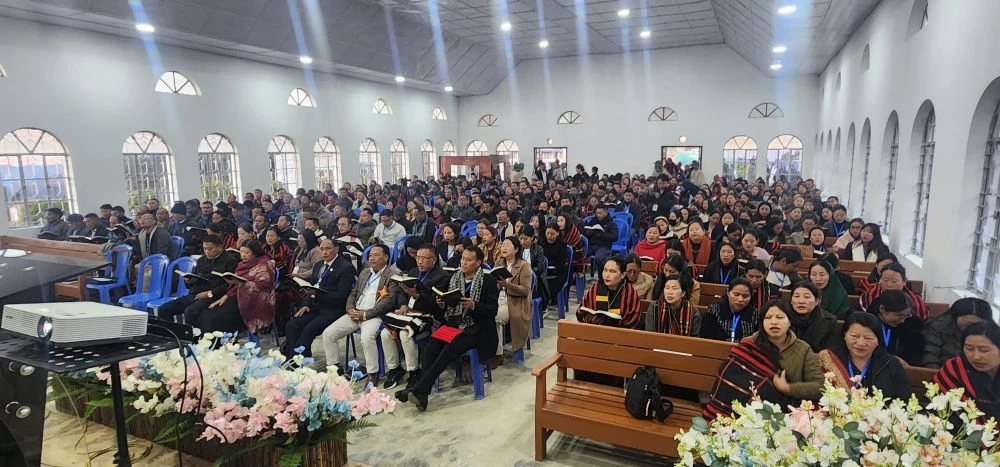Y Kikheto Sema, IAS, Principal Secretary to Government of Nagaland addressing the 59th Church Leadership Fellowship under SBAK Nito Mount at Viyixe Baptist Church on November 18.

Principal Secretary questions church spending on conferences, vehicles
Dimapur, November 19 (MExN): Y Kikheto Sema, IAS, Principal Secretary to Government of Nagaland called for church bodies to integrate the principles of the Clean Election Movement into their continuous teachings, questioning the movement's effectiveness after recent state elections saw massive campaign expenditures.
He was the addressing the 59th Church Leadership Fellowship under SBAK Nito Mount at Viyixe Baptist Church on November 18. The three-day event held on the theme, ‘A Model Servant of God’ will culminate on November 20.
The Principal Secretary addressed the issue, noting that despite the movement's strong advocacy by churches, the 2023 state elections saw an estimated Rs 1,281 crore spent by 183 candidates.
“This raises the question of whether the movement is upheld only during election seasons,” Sema said. He urged churches to embed the ideals of Clean Elections into their year-round teachings and practices.
Shifting his critique to internal church finances, Sema expressed concern over the “large-scale expenditures” for religious conferences. He pointed out that hosting a single major conference can cost more than Rs 2550 lakh, not including delegates' personal expenses.
He stated that this financial pressure places an “undue burden” on smaller churches with limited households. With a constant cycle of annual conferences, theological gatherings, and various camps, Sema encouraged churches to re-evaluate the “necessity, frequency, and scale of such events” to ensure their resources are used wisely.
Sema also called on large, resource-rich churches to increase their support for smaller rural congregations and public infrastructure, pointing to their considerable financial resources, which he said sometimes exceed the budgets of government departments.
He emphasized the need for mega churches in urban centers like Kohima and Dimapur, as well as in district headquarters and sub-divisions, to extend greater assistance to weaker and rural churches.

He highlighted the poor condition of many rural school buildings, dispensaries, and health centers used daily by the public, urging churches to respond with “compassionate and practical” action.
According to Sema, the combined tithes, offerings, and donations received by some large churches enable them to contribute meaningfully to community welfare.
Addressing financial priorities, Sema pointed out the significant expenditure by many churches on vehicle purchases, estimating that in Sema-inhabited areas alone, nearly 500 vehicles have been registered under various churches amounting to a combined cost of around Rs 50 crore.
While acknowledging that change is inevitable with time, he questioned whether such investments align with the core mission of the church.
Based on his experience as former Principal Secretary of Health & Family Welfare, Sema expressed deep concern over the rising use of “Shan Flower” and other drugs among young people.
He encouraged churches to intensify preventive and rehabilitative efforts, stating that moral guidance alone is no longer sufficient. He said churches must actively engage with affected individuals and communities.
In this context, he advised churches to reconsider heavy investments in commercial assets and instead prioritize establishing rehabilitation centers to provide support to those struggling with addiction.
Reflecting on environmental stewardship, the officer, recalled a resolution for the protection of flora and fauna adopted during the 74th NBCC Annual Conference at his native village, Rotomi. He said the resolution had also banned the use of wild animals as gifts. Urging leaders to uphold this resolution sincerely, Sema called on them to set an example of responsible stewardship.
Turning to financial practices within churches, Sema reminded the gathering of the 2005 Money Lending Act, which caps interest rates at 3 per cent per annum above existing bank rates. He expressed concern that many churches continue to borrow from private lenders at exorbitant rates ranging from 50% to 100% per annum, far exceeding legal limits and placing congregations at financial risk.
He encouraged churches to instead explore legitimate loan options through banks, where interest rates and borrowing terms are regulated and lawful.
In his concluding remarks, Sema voiced unease over the rapid increase in advanced theological degrees, such as M.Th and doctorates, among church leaders.
He questioned whether this trend is contributing meaningfully to spiritual growth and the well-being of the church community, and encouraged leaders to reflect on the true purpose of theological study. Sema emphasised that academic pursuits must translate into practical service and biblical leadership for the benefit of the community.
A session was led by Boto Awomi, APY of Naltoqa Baptist Church. Earlier, welcome address was given by Ghoito Yepthomi, Head GB of Viyixe Village while pastoral staff of Sumi Baptist Church, Kohima, presented a special song. Mughalu Swu, Chairman of the Church Leaders Fellowship, delivered a sermon based on the event’s theme.






